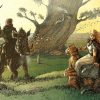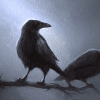Norse
Idun: How An Apple a Day Kept the Aging Away
Idun’s golden apples really did keep death away until she was kidnapped, that is!
There are not very many mentions of Idun in the Norse mythology texts. Still, she is the center of one of the most famous giant heist stories of all time. Forget coins or golden geese; these apples were far more valuable!
This gentle goddess essentially had the strength of Odin and Thor and all the Warrior Gods in her hands. Without these apples daily, the gods aged fast physically and started having back problems and white hairs within one day.
They relied on Idun’s apples for eternal youth. Naturally, she was one of the Ásynjur (a female member of the Æsir), the principal pantheon in Norse mythology.
Let’s delve and find out more about this beautiful fair maiden named Idun!
Who was Idun?
Idun is the goddess of youth and was held in high regard as her apples kept the gods youthful and robust. She carries them in an ash box (no doubt connected to Yggdrasil). She is the only one who can deliver these apples, which earned her the name of the maiden to the gods.
Because of this connection, she is often considered a goddess of fertility, sexuality, and children.
You’ll find mentions of Idun in the Eddas, and historical archaeological burial finds have included apples and other symbols of eternal youth, which attests to this goddess’s popularity.
The name Iðunn means “ever young,” or “the rejuvenating one.” As modern English does not have the (ð) character, she became known as Idun.
The Giant Who Tried to Steal Youth from the Gods
Loki, unhappy at the turn of giant Thiazi taking more than his fair share of some cooked meat, decided that the giant needed to be punished for his greed.
Loki took a pole and started beating the giant (who at this moment was in the guise of a huge eagle).
The pole got lodged in the eagle’s talons, and Loki could not let go of the other end and got dragged along the ground and bashed into trunks of tree and jagged rocks till he was bruised half to death.
Thiazi refused to stop dragging him until Loki agreed to do something for him – rob the gods of their mortality, aka give the giant Idun and her golden apples.
Although he knew what consequences would be, Loki agreed.
Not long after, he came across Idun tending her golden apples. Seizing his opportunity, he casually tells her that he’d seem some even better-looking apples just outside the gates of Asgard.
No sooner than they had stepped out the gate, then Thiazi swooped down and took Idun away to Jotunheim (the world where the giants lived).
Without Idun’s apples, the gods began to age, and their hair grew white, and Idun’s husband could not compose poetry without her.
The gods assemble at a thing (the name for an assembly in early Germanic society) to find out where Idun might have gone. It was soon apparent that the last person to see Idun was Loki.
He was given an ultimatum to either to pay with his life or bring Idun back to Asgard, so he asked Freya for her falcon guise and flew to Jotunheim to rescue Idun.
When he got there, he found Idun alone in the house and changed her into a nut so he could carry her back in his guise as a hawk.
Thiazi was just coming home from a fishing trip and assumed his eagle form to chase kestrel Loki, once he saw she was gone.
As the gods saw Loki flying back with the eagle hot on his tail, they set up fires on the walls, ready to light once Loki was back in the perimeter.
Just in time as the fires engulf the eagle who falls maimed into the courts of Asgard, where the gods are happy to deal the final blows to get rid of this giant foe.
Idun turns back into her beautiful maiden self and dishes out her golden apples to make the gods immortal once more. Her husband can create poetry again.
That’s not the end of the story, though, as Thiazi has a daughter, but I’ll tell you about her later in the article.
Idun’s Family Tree
Idun was unlike the other gods, as she was no warrior queen or Valkyrie, but sensitive, naive and light and airy. Like her husband Bragi, she was happy and bubbly.
Being so light, fair, and beautiful, it may come as no surprise that her father was an elf, as the poem Hrafnagaldr Óðins describes:
In the dales dwells,
the prescient Dís,
from Yggdrasil’s
ash sunk down,
of alfen race,
Idun by name,
the youngest of Ivaldi’s
elder children.
Other Goddesses With Similar Characteristics
Idun resembles and is compared to a lot of similar goddesses from European mythology, like:
- Eostre, the Anglo-Saxon maiden of renewal, also known as Ostara in Germany. Eostre herself is compared to the Roman Aurora and the Greek Eos.
- The Greek goddess of youth called Hebe, who also tended her celestial orchard of golden apples to ensure the Olympus Gods had immorality.
- Nimune, the Avalon enchantress maiden who lives in the land of apples where regeneration of even mortal wounds is possible.
More About Idun’s Apples
Idun dispensed immortal golden apples, but it turns out that they might not have even been apples at all!
In the modern-day interpretation of Norse mythology, apple is the assumed meaning. But the old Norse word for apple was used to describe any fruit or nut. In the way we think of them now, apples did not arrive till the Middle Ages in this part of the world. So Idun’s outstanding produce for the immortality of the gods could have been any number of things.
Folklorist Hilda Ellis Davidson suggests that as fruits and nuts (significant as Idun was turned into a nut) were found in Germanic burial sites in England and elsewhere, the symbolism of nuts representing fertility could have stemmed from this myth.
She also writes about a connection between apples and the Vanir. These gods are associated with fertility as gifts of golden apples are given to woo gods and encourage pregnancy.
In the Volsunga saga, the goddess called Frigg sends King Ririr an apple to answer his prayer for a child. Frigg’s messenger in cow form drops the apple on Rerir’s lap, and when his wife consumes it, she becomes pregnant for 6 years, and finally, the hero Volsung is born.
What Happened After the Giant was Killed?
After the death of her father, Thiazi, Skaldi wanted revenge or compensation!
Her courage of barging into Asgard and walking up to the gods and demanding compensation was considered a just request.
She had three requests, which were granted.
(1) That Odin creates stars from Thiazi’s eyes and put them prominently in the sky.
(2) The gods most make her laugh. Everything failed until Loki has a tug of war with a goat by tying his balls to the goat! The gods roared with laughter, and Skaldi let out a small giggle.
(3) Lastly, she wanted to marry one of the gods, and the gods agreed, but with one condition. She had to pick which god to marry by choosing who’s feet she liked the best. She didn’t pick who she initially wanted. Still, upon discovering the wealth, realm, and kindness of Njordr, the god of the sea, she accepted.
Modern References to Idun
Because of her beauty and pureness and infamous golden apples, Idun has inspired many painter and sculptures to render their artistic depictions like H E Freund’s 1821 statute and J Doyles Penrose’s 1890 ‘Idun and the Apples’ painting.
Composer Wagnar’s Der Ring des Nibelungen includes Fria, which is said to be a combination of Freyja and Idun.
There is a mountain on Venus named after her – Idunn Mons.
In the video game God of War (2018), Apples of Idun are collectible items to help the player. However, the goddess herself does not make an appearance.
Idun – her vitality, apples and youth transcend time, and her beauty and story still inspire.



